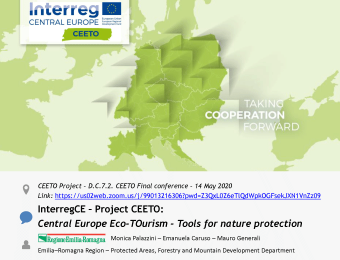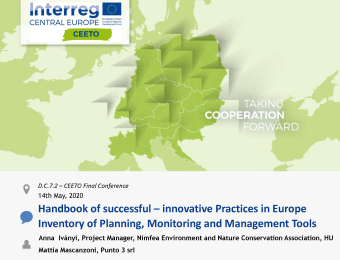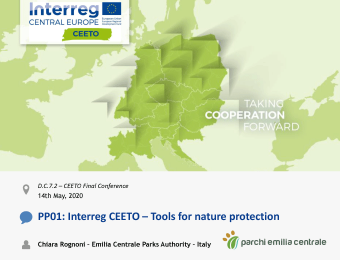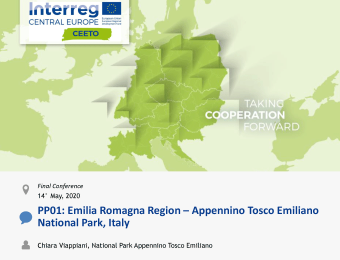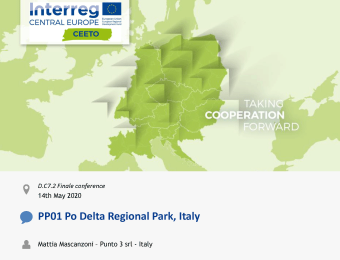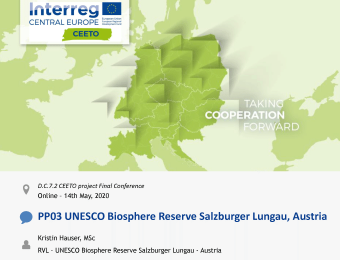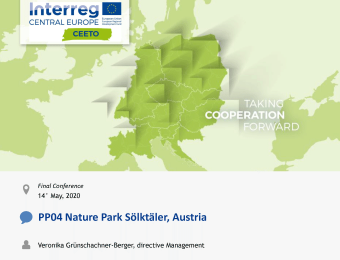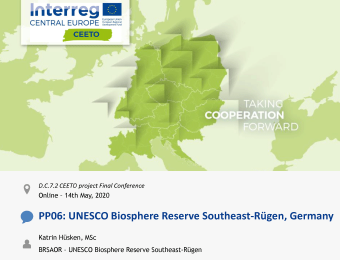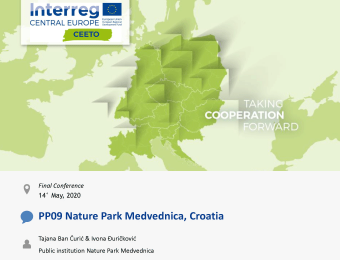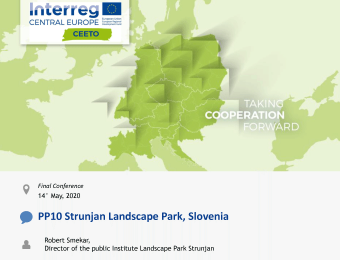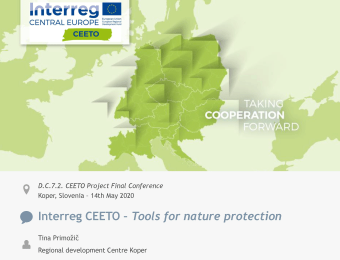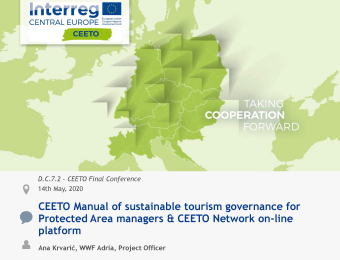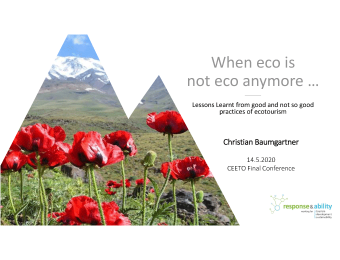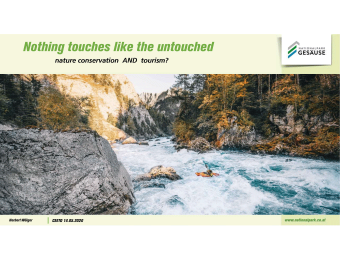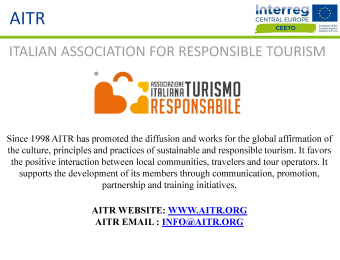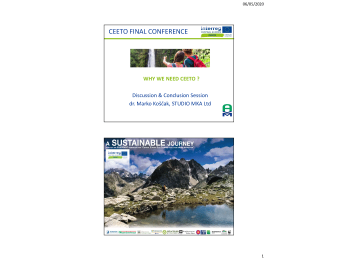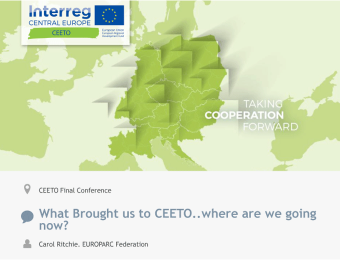CEETO Final Conference on Sustainable Tourism
May 14th 2020 - 09:30h to 15:30h (CET), online.
Organised by Sölktäler Nature Park, Austria.
Moderated by Christian Baumgartner, Vice-director of CIPRA.
On May 14th 2020, CEETO Interreg Central Europe project organised its Final Conference, the wrap up event before its closure, from the hand of one of its partners, the Naturpark Sölktäler in Austria. The CEETO Final Conferences was attended by over 200 participants from the 500 original registrants and included a wide array of presentations and contributions from different experts on Sustainable Tourism. The whole event was greatly moderated by Christian Baumgartner, Vice-director of the International Commission for the Protection of the Alps (CIPRA) and expert on Sustainable Tourism.
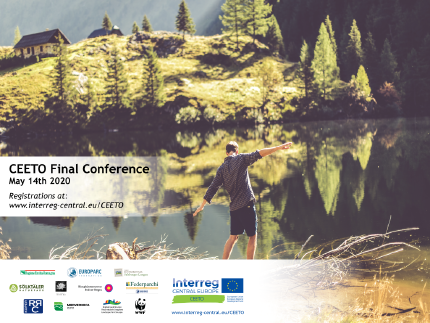
The Conference programme offered the opportunity to the international audience to learn about the goals of the CEETO project, the Protected Areas involved in it and the main outcomes resulting from its implementation, as well as to engage in the live discussions about Sustainable Tourism.
If you didn´t attend to the Conference, or may you want to review some of the contents, the Conference was recorded and divided in three sessions that are available to watch online:
Conference Presentations
Below, you can find a repository of the Conference speakers and presentations:
CEETO Project - Goals and Development
By Monica Palazzini - Emilia Romagna Region, Italy (CEETO Lead Partner).
An overview of the project and the Interreg CE programme, the Sustainable Tourism principles and how CEETO project applies them. Monica also highlighted how Sustainable Tourism can be applied in the current situation of global pandemia, how the main outputs target different acion groups and the lessons learned during the project, specifically those regarding visitor’s flow monitoring and stakeholders engagement. Likewise, the main lessons learned in the production of the CEETO Guidelines an Manual.
CEETO Project Key Tools
Handbook of successful – innovative Practices in Europe
By Anna Iványi, Project Manager, Nimfea Environment and Nature Conservation Association, Hungary.
Anna presented the Sustainable Tourism foundations and the function of CEETO collecting information on the impacts that we, as tourist, have on the environment and the survey carried out within CEETO among stakeholders to know their needs. An overview of the Handbook of successful and innovative practices for a sustainable tourism inside Protected Areas was provided, and concluded saying that Sustainable Tourism development requires long term vision, the involvement of all stakeholders and needs of all the community.
Inventory of Planning, Monitoring and Management Tools
By Mattia Mascanzioni - Punto 3 srl, Italy.
Mattia presented the CEETO Inventory of planning, management, monitoring tools and success stories for sustainable tourism in Protected Areas, wich provides an overview of monitoring methodologies of tourist flows in and best practices of Sustainable Tourism in Protected Areas. This document is addressed to Protected Area managers and stakeholders, but it is also useful for Universities, NGOs and other institutions.
CEETO Pilot Actions
Parchi Emilia Centrale, Italy
By Chiara Rognoni – Emilia Centrale Parks Authority.
Chiara presented the Nirano’s Mud Vulcanoes Nature Reserve, where an artificial intelligence monitoring system was implemented, and Parco del Frignano, which includes the Lake Santo Pilot Area and where actions to improve the accessibility were implemented. Also, she highlighted how the development of the CEETO Sustainable Tourism Action Plan was the basis and first approach to apply to the European Charter for Sustainable Tourism in Protected Areas in 2019.
Appennino Tosco Emiliano, Italy
By Chiara Viappiani, National Park Appennino Tosco Emiliano.
In the Appeninno National Park and Biosphere Reserve, two Pilot Areas were selected for the CEETO project implementation: Lagdei Plain and Pietra di Dismantova, in which accessibility solutions and awareness and information actions were undertaken. Chiara also explained the visitors monitoring system implemented in the park to assess the visitors number, behaviour and profiles. One of the main results of the Pilot Actions was the creation of a map of collaborations between the park and the Biosphere Reserve's stakeholders.
Po Delta Regional Park, Italy
By Mattia Mascanzioni - Punto 3 srl.
Mattia, on his second exposition, presented the Po Delta Regional Park Pilot Action, whose main objectives were to extend the seasonality and the territority visited. He continued with the monitoring carried out in the Park's visitors centres and the strategic visitor flows performed through the Saint Gallen method, as well as the communication activities carried out, such as the Protected Areas Open Days, display of information panels and awareness campaigns.
UNESCO Biosphere Reserve Salzburger Lungau, Austria
By Kristin Hauser - RVL UNESCO Biosphere Reserve Salzburger Lungau
A presentation on the Biosphere Reserve Salzburger Lungau, their challenges with tourism management, the participatory process and the monitoring activities carried out during the Pilot Action of the Park. The main findings obtained through the project regarding low existing tourism pressure, improvement on the information provided to visitors and improvement in cooperation between stakeholders, as well as challenges and lessons learned.
Nature Park Sölktäler, Austria
By Veronika Grünschachner-Berger, Directive Management of Nature Park Sölktäler
Veronika presented the main features of the Nature Park Sölktäler and the low tourism pressure existing at the moment. She continued explaining the creation of a map of land use and wildlife areas, in order to keep tourist away from the wildlife grounds. This Pilot Action action is included in a 5 years Action Plan and is continuously monitored and improved.
UNESCO Biosphere Reserve Southeast-Rügen, Germany
By Katrin Hüsken - BRSAOR, UNESCO Biosphere Reserve Southeast-Rügen
A presentation on the Pilot Area of Zicker Berge area that was selected for CEETO project implementation inside the UNESCO Biosphere Reserve Southeast-Rügen. The objective of this Pilot Action was to gather knowledge on visitors profile and how they use the area, and raise awareness among tourists in order to influence their behaviour. For it, two electronic systems were implemented to count visitors flows and complemented with questionnaires. Also, an audio-guide in German and English was produced and other improvements in visitors trails were carried out to improve visitor's experience. The main results and the progress assessed in the use of the application, visitors peak and other data was also presented.
Nature Park Medvednica, Croatia
By Tajana Ban Ćurić & Ivona Đuričković - Public institution Nature Park Medvednica
Presentation of Nature Park Medvednica and its main threats and challenges regarding sustainable tourism, which are mainly the high affluence of visitors and limited parking space during the high season (spring) and that results in safety and ecological problems. The Pilot action was focused on the installation of electronic car counters and video cameras, visitors surveys through questionnaires and visitation impacts on nature, as well as communication activities. Tajana also presented the future steps to take to reduce visitor’s pressure and contribute to nature conservation.
Strunjan Landscape Park, Slovenia
By Robert Smekar - Director of the public Institute Landscape Park Strunjan.
A presentation on the Strunjan Landscape Park and the Pilot Action Regulation of the Belvedere Terraces, noting the massive tourist flows and potential degradation of the area, for which they designated a buffer zone. This solution also included the adjustment of the municipal spatial plan, alternative means of transport and raising visitors awareness.
Project Key Outputs
Guidelines for developing a Sustainable Tourism in Protected Areas
By Tina Primožič - Regional development Centre Koper, Slovenia
The CEETO Guidelines target policy makers at national, regional and local levels, as well as park managers and other conservation practitioners. Their objective is to build an understanding of Protected Area management and provide a platform and guidance to support the development of Sustainable Tourism strategies.
Manual of Sustainable Tourism Governance for Protected Areas managers & CEETO Network on-line platform
By Ana Krvarić - Project Officer at WWF Adria, Croatia.
The CEETO Manual also aims to support the development and governance of Sustainable Tourism in Protected Areas but has been created specifically for Protected Area Managers. It is based on the experience of the 8 Pilot Actions previously presented and other project outcomes. The manual provides guiding principles and international framework, Sustainable Tourism development and management process, overview of CEETO case studies and reference literature. Ana also presented the CEETO Network, which will allow sustainable tourism experts to exchange ideas and knowledge, collaborate in future projects and find all the project outcomes after the project closure.
Eco-tourism - key problems: Indicators, Problems, potential Solutions in Practice, Prevention, Requirements for Management
When eco is not eco anymore: Lessons learnt from good and not so good practices of ecotourism
By Christian Baumgartner, Vice-director of the International Commission for the Protection of the Alps (CIPRA)
Christian did an analisis of Eco-tourism, what associations are working on this area and different meanings of this term and its evolution through time. He presented the example of Galapagos Islands, where ecotorurism does not mean environmentally friendly and stressed the importance of assessing the carrying capacity of visitors and setting limits of acceptable change. He also provided some project examples of tourism development that seem quite alarming due to their orientation towards marketing goals more than towards a sustainable management of tourism and, in contraposition, an example of the projects Transylvanian Brunch (RO) and the Grande Traversatta delle Alpi (GTA), whcih follow Sustainable Tourism approaches. Christian concluded with the lessons learned from successfuls sustainable eco-tourism projects.
Nothing touches like the untouched: nature conservation and tourism in harmony?
By Herbert Wölger - National Park Gesäuse, Austria.
Herbert presented a position paper based on the Gesäuse National Park, a hotspot for endemic species well visited by outdoor sportsmen (kayakers, climbers,…) and presented the main problems related to tourism, such as wildlife disturbance, infrastructures development, excesive traffic and unappropriate visitor's behaviour. He stressed the different roles of National Park authorities (guardian of values) against Tourism Associations (promotors of values). Herbert presented four project examples of ecotourism developed in the park, such as the creation of a network of partner companies, winter visitor guidance, the Luchs Trail project and a Fotofestival.
Slow tourism in practice - Environment and Socio-Cultural Sustainability of Tourism
By Maurizio Davolio - Associazione Italiana Turismo Responsabile.
Maurizio presented two successful experiences. On one hand, the example of NaturValp, an association for the development and promotion of responsible tourism in Valpelline, Italy, its mission and main activities they develop. On the other hand, the example of AlterEco, a cooperative that works in Equi Terme, Italy, for the development of responsible tourism and community welfare.
Conclussions
Why we need CEETO?
By Marko Koscak - Studio MKA d.o.o, cooperation of Regional development Centre Koper, Slovenia
Marko highlighted the many existing evidences that support the necessity of projects like CEETO. He analised the importance of finding a balance between sustainability and mass tourism and stressed that management of tourism in Protected Areas requires a lot of cooperation with local communities. Marko concluded with a review of the benefits that CEETO brings to the different target audiences.
What brought us CEETO?
By Carol Ritchie - Executive Director of EUROPARC Federation.
Carol explained the experience of EUROPARC in implementing CEETO project and finding solutions to the challenge of delivering Sustainable Tourism. She stressed the importance of continuing the work of the project, articulating it through the CEETO network, in order to collaborate and progress together. The CEETO has created a basis to rethink, restart, recommunicate our sustainable tourism options. Especially during the international pandemia situation, we need to reflect on our approaches, we need a clear vision of Sustainable Tourism for our Protected Areas and communities and highlight its benefits.
